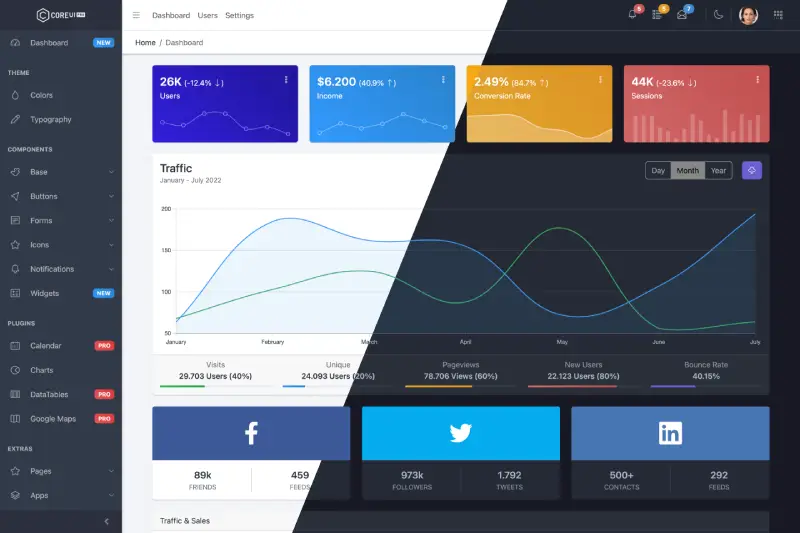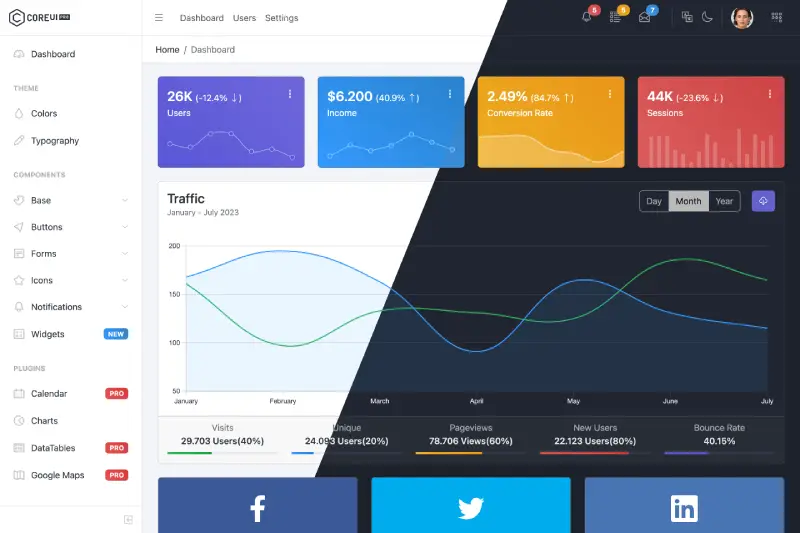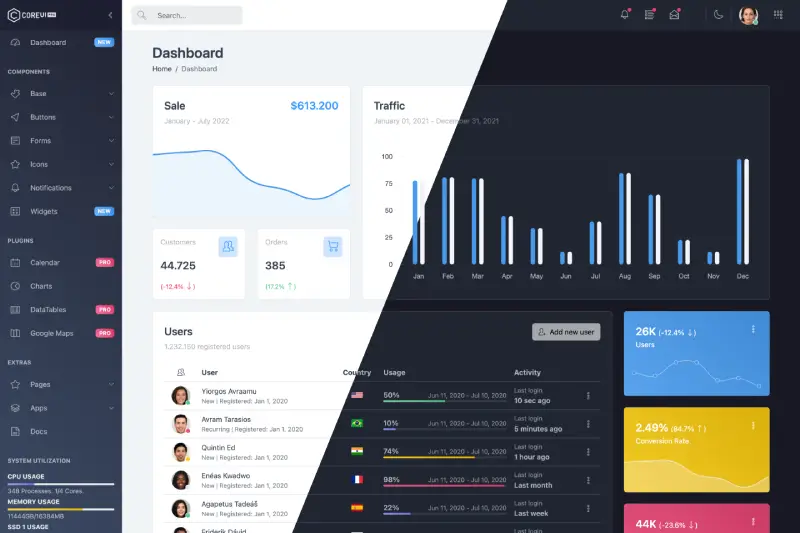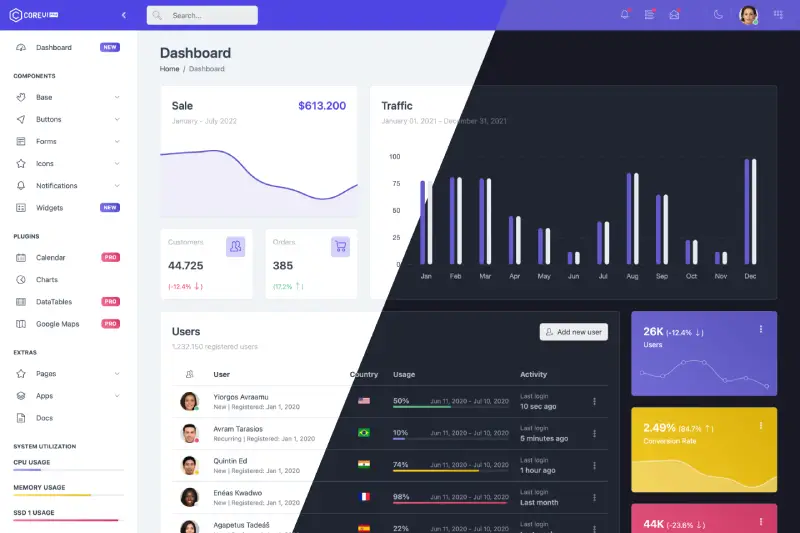CoreUI is meant to be the UX game changer. Pure & transparent code is devoid of redundant components, so the app is light enough to offer ultimate user experience. This means mobile devices also, where the navigation is just as easy and intuitive as on a desktop or laptop. The CoreUI Layout API lets you customize your project for almost any device – be it Mobile, Web or WebApp – CoreUI covers them all!
- CoreUI Angular Admin Dashboard Template & UI Components Library
- CoreUI Angular Demo
- CoreUI Angular Docs
- Versions
- CoreUI Pro
- Quick Start
- Installation
- Basic usage
- What's included
- Documentation
- Versioning
- Creators
- Community
- Copyright and License
- CoreUI Free Bootstrap Admin Template
- CoreUI Free Angular Admin Template
- CoreUI Free React.js Admin Template
- CoreUI Free Vue.js Admin Template
- 💪 CoreUI Pro Angular Admin Template
- 💪 CoreUI Pro Bootstrap Admin Template
- 💪 CoreUI Pro React Admin Template
- 💪 CoreUI Pro Next.js Admin Template
- 💪 CoreUI Pro Vue Admin Template
| Default Theme | Light Theme |
|---|---|
 |
 |
| Modern Theme | Bright Theme |
|---|---|
 |
 |
- Download the latest release
- Clone the repo:
git clone https://github.com/coreui/coreui-free-angular-admin-template.git
Before you begin, make sure your development environment includes Node.js® and an npm package manager.
Angular 20 requires Node.js LTS version ^20.19.0 || ^22.12.0 || ^24.0.0.
- To check your version, run
node -vin a terminal/console window. - To get
Node.js, go to nodejs.org.
Install the Angular CLI globally using a terminal/console window.
npm install -g @angular/cli$ npm install
$ npm update# dev server with hot reload at http://localhost:4200
$ npm startNavigate to http://localhost:4200. The app will automatically reload if you change any of the source files.
Run build to build the project. The build artifacts will be stored in the dist/ directory.
# build for production with minification
$ npm run buildWithin the download you'll find the following directories and files, logically grouping common assets and providing both compiled and minified variations. You'll see something like this:
coreui-free-angular-admin-template
├── src/ # project root
│ ├── app/ # main app directory
| │ ├── icons/ # icons set for the app
| │ ├── layout/ # layout
| | │ └── default-layout/ # layout components
| | | └── _nav.js # sidebar navigation config
| │ └── views/ # application views
│ ├── assets/ # images, icons, etc.
│ ├── components/ # components for demo only
│ ├── scss/ # scss styles
│ └── index.html # html template
│
├── angular.json
├── README.md
└── package.json
The documentation for the CoreUI Admin Template is hosted at our website CoreUI for Angular
For transparency into our release cycle and in striving to maintain backward compatibility, CoreUI Free Admin Template is maintained under the Semantic Versioning guidelines.
See the Releases section of our project for changelogs for each release version.
This project was generated using Angular CLI version 20.0.2.
To start a local development server, run:
ng serveOnce the server is running, open your browser and navigate to http://localhost:4200/. The application will automatically reload whenever you modify any of the source files.
Angular CLI includes powerful code scaffolding tools. To generate a new component, run:
ng generate component component-nameFor a complete list of available schematics (such as components, directives, or pipes), run:
ng generate --helpTo build the project run:
ng buildThis will compile your project and store the build artifacts in the dist/ directory. By default, the production build optimizes your application for performance and speed.
To execute unit tests with the Karma test runner, use the following command:
ng testFor end-to-end (e2e) testing, run:
ng e2eAngular CLI does not come with an end-to-end testing framework by default. You can choose one that suits your needs.
For more information on using the Angular CLI, including detailed command references, visit the Angular CLI Overview and Command Reference page.
Łukasz Holeczek
CoreUI team
Get updates on CoreUI's development and chat with the project maintainers and community members.
- Follow @core_ui on Twitter.
- Read and subscribe to CoreUI Blog.
CoreUI is an MIT-licensed open source project and is completely free to use. However, the amount of effort needed to maintain and develop new features for the project is not sustainable without proper financial backing. You can support development by buying the CoreUI PRO or by becoming a sponsor via Open Collective.
Support this project by becoming a Platinum Sponsor. A large company logo will be added here with a link to your website.
Support this project by becoming a Gold Sponsor. A big company logo will be added here with a link to your website.
Support this project by becoming a Silver Sponsor. A medium company logo will be added here with a link to your website.
Support this project by becoming a Bronze Sponsor. The company avatar will show up here with a link to your OpenCollective Profile.
Thanks to all the backers and sponsors! Support this project by becoming a backer.
copyright 2025 creativeLabs Łukasz Holeczek.
Code released under the MIT license. There is only one limitation you can't re-distribute the CoreUI as stock. You can’t do this if you modify the CoreUI. In the past, we faced some problems with persons who tried to sell CoreUI based templates.







